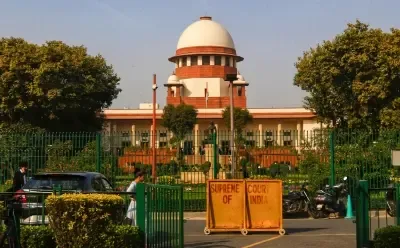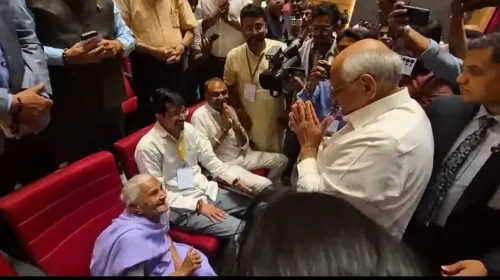Did the SC Uphold the Dismissal of a Christian Officer for Refusing to Enter a Mandir and Gurdwara?

Synopsis
Key Takeaways
- The Supreme Court upheld the dismissal of a Christian officer for refusal to follow military commands.
- Discipline and cohesion are paramount in the armed forces.
- Personal beliefs must sometimes yield to institutional expectations.
- The ruling reinforces the secular nature of the Indian Army.
- Respect for diversity in faith remains a critical issue.
New Delhi, Nov 25 (NationPress) The Supreme Court on Tuesday chose not to intervene in the case of a Christian officer who was dismissed from the Indian Army in 2021 for declining to enter the inner sanctum of his regiment’s Mandir and Gurdwara during weekly religious parades.
A Bench led by Chief Justice of India Surya Kant and Justice Joymalya Bagchi reiterated the Delhi High Court’s ruling, affirming the Army's decision based on the premise that Lieutenant Samuel Kamalesan's actions constituted disobedience to lawful military orders, which undermined unit cohesion.
The CJI Kant-led Bench expressed disapproval of the officer's steadfast refusal to enter the inner shrine, citing that his faith prevented him from doing so, despite ongoing counseling from senior officials and even a local pastor. “If this is the attitude of an Army officer, then what to say!” the apex court commented while dismissing the plea.
Assigned to a Sikh squadron, Lt Kamalesan contended that entering the sanctum would breach the First Commandment—“You shall have no other gods before me.” He maintained that he consistently participated in the parades but chose to stand outside the most sacred area to honor both his faith and the feelings of his fellow soldiers.
Conversely, the Army argued before the Delhi High Court that the matter was one of discipline and leadership, rather than personal belief.
In its ruling, the Delhi High Court noted that the Armed Forces operate under heightened discipline governed by the principle of “nation before self; and certainly, nation before religion.” As a Commanding Officer, the Delhi HC pointed out, Kamalesan bore an extra responsibility to connect with his troops and uphold morale.
Upholding his dismissal, Justices Navin Chawla and Shalinder Kaur of the Delhi HC, in their order dated May 30, stated, “The petitioner has placed his religion above a lawful command from his superior. This is unequivocally an act of indiscipline.”
The Supreme Court also questioned whether the officer’s behavior was not disrespectful to the faith of his own soldiers. “You refuse to go just because there is a temple and Gurdwara? Doesn’t that hurt the feelings of your soldiers?” the CJI Kant-led Bench inquired.
“Where in Christian doctrine is entering the sanctum sanctorum of a temple prohibited? Article 25 safeguards essential practices, not individual sentiments,” it added.
Senior advocate Gopal Sankaranarayanan, representing Kamalesan, argued that the officer was being penalized for a single infraction, claiming he was otherwise “disciplined in all respects.” Sankaranarayanan also highlighted that Kamalesan had participated in ceremonies at “Sarva Dharma Sthals” elsewhere, but at his current posting, there were “only a temple and a Gurdwara.” The apex court noted that even a pastor advised the officer that entering the regimental place of worship would not breach Christian principles.
“You cannot hold a personal interpretation of your faith, especially while in uniform,” the CJI Kant-led Bench remarked, labeling the conduct “the grossest form of indiscipline by an Army official.”
When the petitioner sought a reduction of the penalty based on proportionality, the Supreme Court refused. “You may excel in numerous areas, but the Indian Army is renowned for its secular ethics. When you fail to uphold discipline in this regard… you neglect the sentiments of your own soldiers,” it stated.
Dismissing the appeal, the CJI Kant-led Bench asserted that its ruling would “send a strong message.”









